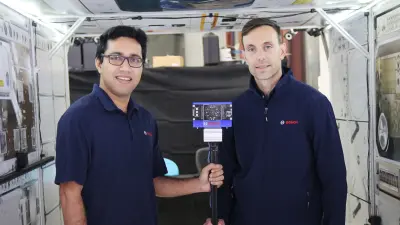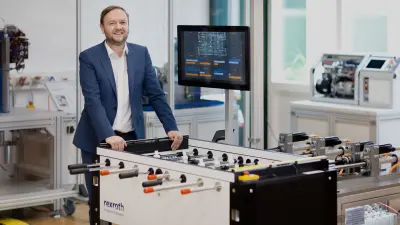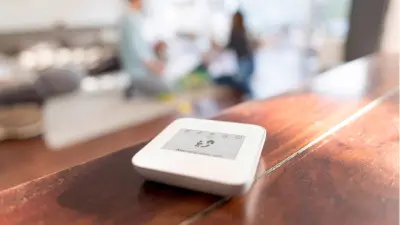Bosch meets Vitesy
The Italian startup develops smart planters against indoor air pollution

Within #betalife stories, we present trendsetting ideas and concepts of start-ups and companies and make tomorrow’s technologies experienceable today.
A smart flowerpot that combines nature and technology: Designed by an Italian start-up, the concept improves the quality of indoor air.
Regular ventilation isn’t enough: As we spend 90 per cent of our time indoors, we are exposed to many pollutants from furniture, building materials, cleanings sprays, cooking, and more. The air inside is even up to five times more contaminated than outside, and this not only applies to bars where people smoke. Textiles and cleaning agents for example contain alcohols, aldehyde and organic acids that vaporize at room temperature. These volatile organic compounds (VOCs) make people tired, cause headaches and can even increase the risk of cancer.
The Italian start-up “Vitesy” frees the rooms in which we live and work from pollutants — with sensors, a technological core and a mini ventilator all combined in a smart flowerpot. Vitesy's natural air purifiers are completely manufactured in Italy and also freshen up spaces optically.
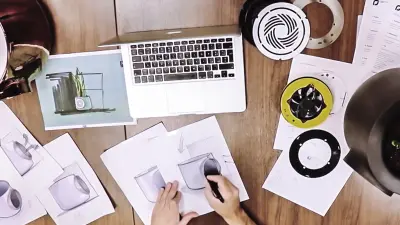
36 cubic meter
room volume is freshened by a single Vitesy flowerpot in 24 hours.
At Pioneers 2018, a trade show for start-ups in Vienna, Vitesy's natural air purifier made of environmentally-friendly materials excited the jury of the Bosch Pitching Challenge, where the focus was on creative elements in everything to do with the internet of things. As the winner of the Pitching Challenge, Vitesy and Bosch will in future work closely together to jointly spark further innovations.
The root filter
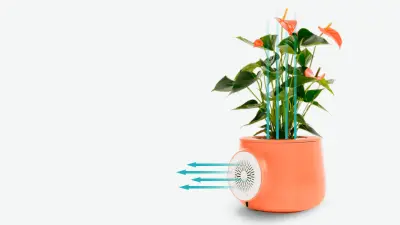
The efficiency of Clairy — which is the name of the first product — is down to the ventilation system and the high-quality sensors, designed to force the air through the roots to enhance the depuration capacity of the plants. In the soil, the toxins are filtered out in a natural way. Thanks to the fan, clean air flows back out.
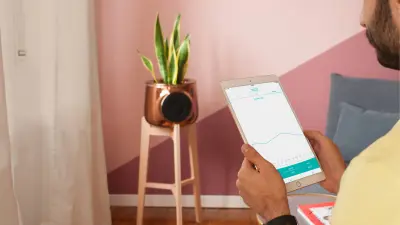
With the help of the sensors, Clairy can measure the temperature, the humidity as well as the VOC share and therefore determine the degree of pollution in the room. Clairy connects to WiFi and it can be managed with an app where the user can monitor the air quality in real time. That’s what makes the planter so fascinating — the interaction between nature and technology.
“We asked ourselves, why not utilize this power — and give it a purpose with smarter technology?””
Paolo Ganis, Alessio D’Andrea and Vincenzo Vitiello, founders of Vitesy, found out about the power of plants during university. Everything started with an article on NASA researchers who, in the 1980s, noticed that certain plants also filtered out harmful substances in the air through their roots. “We asked ourselves, why not utilize this power — and give it a purpose with smarter technology,” says Ganis.
In March 2016, Vitesy’s founders initiated a Kickstarter campaign to enable them to produce Clairy. Three months later, they had the funding needed for the project. “It motivates us to go one better,” says Ganis. It was therefore followed in April 2018 by NATEDE, an advanced version of Clairy. This time around, the goal of 50,000 euro was reached via Kickstarter within the space of 12 hours and obtained a sensational almost one million dollars pre-orders in 45 days.
A planter with AI
Compared to its predecessor, NATEDE has six sensors instead of three. The natural air purifier therefore measures the carbon dioxide and carbon monoxide levels as well as the ultra-fine particulates in the air. It also communicates with its owners via a LED light. A constant blue light means the air is pure. The worse the quality, the more the light flickers — almost as if NATEDE is gasping for air. The user therefore knows that he or she has to react.
Paolo Ganis and his team have done everything so that things do not go so far — and have equipped NATEDE with artificial intelligence. The machine learning algorithms memorize the daily rhythm of its owner — like when he cooks or returns home and how it influences the air around him.
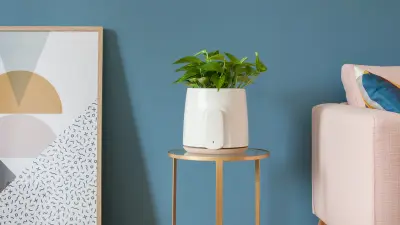
93 per cent
less environmental pollution in the surroundings.
It can’t get any greener
After all NATEDE’s hard work directing the many pollutants into the roots, there is no need to replace the filter as it is made of a photocatalytically active material. Photocatalysis is the term used for a chemical reaction whereby air is freed of organic contamination like viruses or bacteria. All that it needs is UV radiation.
The startup Vitesy would not be Clairy if Paolo and his team became satisfied with the status quo. Paolo’s motto: “Even more improvements can be made to every product.” The start-up will continue to develop existing products in the future as well as launching new innovations and services. “We and Bosch are working on new sensor solutions for future products,” says Ganis. Vitesy has already proved one thing: technology and nature can enrich one another.
Paolo Ganis, co-founder of Vitesy
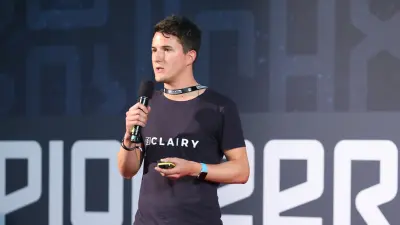
Paolo Ganis was born in Johannesburg, South Africa. When still a child, he and his family left for Italy where he studied business management in Trieste and Milan. He worked for five years in corporate finance at a Fortune 50 company but has been a passionate entrepreneur ever since. Aged only 27, he was the co-founder of Talent Garden Pordenone in 2015, a campus for co-working, training and events. The founding of Vitesy followed in the same year. The start-up now has a 20-strong workforce and has received several awards in the recent past. Paolo himself has been a guest speaker and ambassador at a variety of events all around the world and was selected as finalist for the “Best Worldwide Youth Entrepreneur” competition during the G20 summit in Germany in 2017. Another highlight followed in September 2018: At the IFA 2018 in Berlin, the worldwide leading trade show for consumer electronics and home appliances, Clairy won the den “IFA Next Smart Home Award”.
